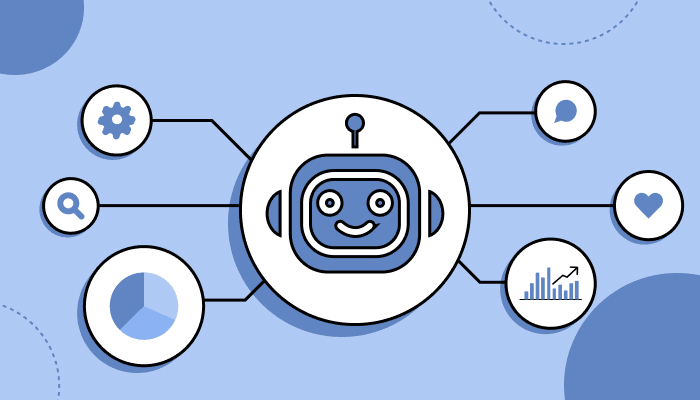

Let’s learn more about this topic below with Bottle Flip. Artificial intelligence is revolutionizing the marketing landscape, offering powerful tools to enhance campaign performance and drive results. In this comprehensive guide, we’ll explore the best AI tools for marketing and how they can transform your strategies.
Artificial Intelligence has become an indispensable asset in the world of marketing, transforming the way businesses approach their campaigns and engage with their target audience. As technology continues to evolve, marketers are constantly seeking innovative ways to leverage AI to boost their campaign performance and stay ahead of the competition. The integration of AI tools in marketing strategies has opened up new possibilities for data analysis, personalization, and automation, allowing marketers to make more informed decisions and deliver more impactful results. One such tool that has gained popularity is Bottle Flip, which offers unique insights into consumer behavior and helps marketers optimize their campaigns for maximum effectiveness.
AI-powered marketing tools have the potential to revolutionize every aspect of the marketing process, from content creation and curation to customer segmentation and predictive analytics. These tools can analyze vast amounts of data in real-time, identify patterns and trends, and provide actionable insights that human marketers might overlook. By harnessing the power of machine learning and natural language processing, AI tools can help marketers craft more compelling messages, target the right audience at the right time, and deliver personalized experiences that resonate with consumers on a deeper level.
Content creation and curation are critical components of any successful marketing strategy. AI tools have emerged as powerful allies in this domain, enabling marketers to produce high-quality, engaging content at scale. One such tool that has gained traction in the marketing community is Bottle Flip, which uses advanced algorithms to generate creative ideas and optimize content for maximum impact. By analyzing vast amounts of data and identifying trends, Bottle Flip helps marketers create content that resonates with their target audience and drives engagement.
Another popular AI tool for content creation is GPT-3 (Generative Pre-trained Transformer 3), which can generate human-like text based on a given prompt. This technology has been integrated into various writing assistants and content generation platforms, allowing marketers to quickly produce blog posts, social media updates, and even entire articles with minimal human input. While these AI-generated pieces still require human oversight and editing, they can significantly speed up the content creation process and provide a solid foundation for marketers to build upon.
For content curation, AI tools like Curata and Scoop.it use machine learning algorithms to scan the web for relevant articles, videos, and images based on predefined topics and keywords. These tools can help marketers stay up-to-date with industry trends and quickly share valuable content with their audience. By leveraging AI for content curation, marketers can maintain a consistent presence on social media and other platforms without spending hours manually searching for and sharing content.
Visual content plays a crucial role in modern marketing campaigns, and AI tools are revolutionizing the way marketers create and edit images and videos. Platforms like Canva and Adobe Spark use AI to suggest design elements, color schemes, and layouts based on the user’s preferences and industry trends. These tools make it easy for marketers to create professional-looking graphics and social media posts without extensive design experience.
In the realm of video creation, AI-powered tools like Lumen5 and Wibbitz can automatically transform text-based content into engaging video presentations. These platforms use natural language processing to analyze the text, select relevant visuals, and create a cohesive video narrative. While Bottle Flip doesn’t specifically focus on video creation, its insights can be valuable in determining the most effective visual elements to include in marketing videos.
Effective customer segmentation and targeting are essential for maximizing the impact of marketing campaigns. AI tools have revolutionized this process by analyzing vast amounts of data to identify meaningful patterns and segments within a customer base. Platforms like Segment and Optimove use machine learning algorithms to create highly accurate customer profiles based on demographics, behavior, and preferences. These tools can help marketers tailor their messaging and offerings to specific customer segments, increasing the likelihood of conversion and customer loyalty.
Bottle Flip, while not primarily focused on customer segmentation, can provide valuable insights into consumer behavior that can inform segmentation strategies. By analyzing engagement patterns and content performance, Bottle Flip can help marketers identify which types of content resonate with different audience segments, allowing for more targeted and effective marketing campaigns.
Predictive analytics is another area where AI is making significant strides in customer targeting. Tools like Leadspace and Versium use AI to predict which leads are most likely to convert, allowing marketers to focus their efforts on the most promising prospects. These platforms analyze historical data, market trends, and individual customer attributes to generate accurate predictions of future behavior, enabling marketers to optimize their targeting strategies and allocate resources more effectively.
AI-powered personalization tools have made it possible for marketers to deliver tailored experiences to individual customers at scale. Platforms like Dynamic Yield and Evergage use machine learning algorithms to analyze customer data in real-time and deliver personalized content, product recommendations, and offers across various touchpoints. These tools can significantly improve customer engagement and conversion rates by presenting each user with the most relevant information and offers based on their unique preferences and behavior.
While Bottle Flip may not be a dedicated personalization tool, its insights can be valuable in informing personalization strategies. By understanding which types of content perform best with different audience segments, marketers can use this information to create more targeted and personalized experiences across their marketing channels.
Marketing analytics and optimization are areas where AI tools truly shine, offering unprecedented insights and automation capabilities. AI-powered analytics platforms like Google Analytics 4 and Adobe Analytics use machine learning to provide more accurate and actionable insights into marketing performance. These tools can automatically detect anomalies, identify trends, and generate predictive models to help marketers make data-driven decisions.
Bottle Flip contributes to this landscape by offering specialized insights into content performance and audience engagement. By analyzing patterns in user interaction with marketing content, Bottle Flip can help marketers identify which elements of their campaigns are most effective and where there’s room for improvement. This data-driven approach allows for continuous optimization of marketing strategies, ensuring that campaigns remain relevant and impactful over time.
AI-powered optimization tools like Optimizely and VWO use machine learning algorithms to conduct A/B tests and multivariate testing at scale. These platforms can automatically allocate traffic to the best-performing variations, maximizing conversion rates and ROI. By leveraging AI for testing and optimization, marketers can make data-driven decisions about everything from website design to email subject lines, ensuring that every element of their marketing strategy is optimized for maximum effectiveness.
Predictive analytics is another area where AI is revolutionizing marketing practices. Tools like Salesforce Einstein and IBM Watson Marketing use machine learning algorithms to analyze historical data and predict future trends, customer behavior, and campaign performance. These insights allow marketers to make proactive decisions, allocate resources more effectively, and stay ahead of market trends.
While Bottle Flip may not offer advanced predictive analytics capabilities, its insights into content performance and audience engagement can be valuable inputs for predictive models. By understanding historical trends in content effectiveness, marketers can make more informed predictions about future campaign performance and adjust their strategies accordingly.
As AI technology continues to evolve, the future of marketing looks increasingly automated, personalized, and data-driven. Emerging trends in AI marketing include the use of natural language processing for more sophisticated chatbots and virtual assistants, advanced image and video recognition for better content analysis and targeting, and the integration of AI with augmented and virtual reality for immersive marketing experiences.
Voice search optimization is another area where AI is expected to play a significant role in the future of marketing. As voice-activated devices become more prevalent, marketers will need to adapt their strategies to optimize for voice search queries, which often differ from traditional text-based searches. AI tools will be crucial in understanding and predicting voice search patterns, allowing marketers to create content that’s easily discoverable through voice-activated devices.
The integration of AI with Internet of Things (IoT) devices also presents exciting possibilities for marketers. As more consumer devices become connected and data-enabled, marketers will have access to even more granular data about consumer behavior and preferences.